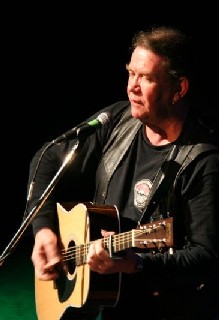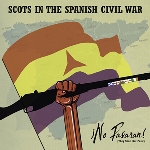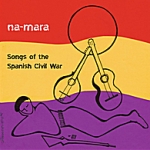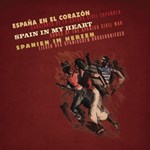
Viva La Quince Brigada - by Christy Moore

Having gone to the USA for my first two choices, I choose Western Europe for my third. Or to be more specific, the Republic of Ireland, for a song about Spain. Not just “a” song, but I respectfully submit, the song on the part the International Brigades played in the Spanish Civil War.
But let me level with you, lest you accuse me of cheating: this is a song I have already written about at some length in FolkWorld’s pages some three years ago. I make no apologies for writing here about it again though: I want now to put it in context and compare it to other well known songs on the subject of the Spanish Civil War.
So let me start by saying that I was born just two years after the end of World War Two. And that as a small kid, I’d heard a lot about the Spanish Civil War, which had only ended the same year as we Brits entered the horrors of armed conflict with a people with whom we shared so much in culture, cuisine and religion. Growing up in the Welsh Valleys, it was a source of great pride to me when I was repeatedly told that the South Wales coalfield provided more volunteers for the International Brigade than any other industrial group in Britain. (Mind you, I have never been able to find documentary proof of that, though I am inclined to believe it.) There was a brilliant TV series on the Welsh involvement, aired some four decades ago, and called The Colliers’ Crusade: it is all there on YouTube, masterfully narrated by the late René Cutforth...with a fine script from the fine Welsh poet and filmmaker, John Ormond.

I grew up firmly believing that unlike the First World War, the Spanish Civil War was a simple case of good against bad. And three songs I encountered fairly early on, helped reinforce that view.
First, Pete Seeger’s memorable rendition of the stirring anthem Viva La Quince Brigada (Long Live The 15th Brigade). Here are the lyrics, and below them, the link to an inspiring performance. Note that it has the same title as the glorious masterpiece I gave chosen to put under my magnifying glass. I respectfully submit however, that Seeger here sings a worthy and gutsy song, but a far from great one:
Viva La Quince Brigada Viva la quince brigada, Rumba la, rumba la, rumba la, Viva la quince brigada, Rumba la, rumba la, rumba la, Que se ha cubierto de gloria. ¡Ay, Manuela! ¡Ay, Manuela! Que se ha cubierto de gloria. ¡Ay, Manuela! ¡Ay, Manuela! Luchamos contra los moros, Rumba la, rumba la, rumba la, Luchamos contra los moros, Rumba la, rumba la, rumba la, Mercenarios y fascistas. ¡Ay, Manuela! ¡Ay, Manuela! Mercenarios y fascistas. ¡Ay, Manuela! ¡Ay, Manuela! En los frentes de Jarama, Rumba la, rumba la, rumba la, En los frentes de Jarama, Rumba la, rumba la, rumba la, No tenemos ni aviones, ¡Ay, Manuela! ¡Ay, Manuela! Ni tanques, ti cañones. ¡Ay, Manuela! ¡Ay, Manuela! Ya salimos de España, Rumba la, rumba la, rumba la, Ya salimos de España, Rumba la, rumba la, rumba la, A luchar en otros frentes, ¡Ay, Manuela! ¡Ay, Manuela! A luchar en otros frentes, ¡Ay, Manuela! ¡Ay, Manuela! Viva la quince brigada, Rumba la, rumba la, rumba la, Viva la quince brigada, Rumba la, rumba la, rumba la, Que se ha cubierto de gloria. ¡Ay, Manuela! ¡Ay, Manuela! Que se ha cubierto de gloria. ¡Ay, Manuela! ¡Ay, Manuela!

[Incidentally, that last song is also better known as ¡Ay, Carmela!]
And another song that made an impact on me growing up, was originally written by Scotsman, Alex McDade: Jarama Valley. It was later reworked by Woody Guthrie. The lyrics that Billy Bragg sings here, seem to be a mixture of the two. It is a decent song, but overshadowed on this clip when he segues into The Internationale, which is a fantastic workers’ anthem, that many people do not realise had its origins in the Spanish Civil War.

And then we come to the third song that I knew growing up. The best of the three, by a distance. Ewan MacColl’s unbearably poignant, Jamie Foyers. I say “Ewan MacColl’s”: but in truth he stole a traditional song based on an event from 1811 in the Penisula War, but reworked it to fit the Spanish Civil War. One lady I know living local to me, is still mad at him...but I gently tell her to cut his memory some slack here: it was far from philistine behaviour on Ewan’s part. Here are the lyrics, in the broad Scots dialect in which Dick Gaughan sings, in the link below:
Jamie Foyers Faur distant, faur distant, lies Foyers the brave Nae tombstone memorial shall hallow his grave For his bones they lie scattered on the rude soil o Spain An young Jamie Foyers in battle wis slain Thair wisnae his equal at wark or at play He wis strang in the Union till his dying day He wis grand at the fitbaa, at the dance he wis braw Young Jamie Foyers wis the flouer o thaim aa He's gane frae the shipyaird that stauns on the Clyde His haimmer lies idle, his tools laid aside Tae the wide Ebro river young Foyers has gane Tae fight by the side o the people o Spain He cam hame frae the shipyaird, took aff his warkin claes O, A mind the time weill in the lang simmer's days He said, "Thinknae lang, lassie, A'll come back again" But young Jamie Foyers in battle was slain In the fight for Belcite, he was aye tae the fore An he focht at Gandesa till he couldnae fight more For he lay owre his machine gun wi a bullet in his brain An young Jamie Foyers in battle was slain Faur distant, faur distant, lies Foyers the brave Nae tombstone memorial shall hallow his grave For his bones they lie scattered on the rude soil o Spain An young Jamie Foyers in battle was slain
And now, having digested those Scots words, prepare for that towering performance by a Dick Gaughan in his pomp: please re-read the above lyrics, as the song plays...
Gosh...!! That was quite something, was it not? So for a song on the Spanish Civil War to top this...well, it must be some song. And of course my song today is just that.
Here are the lyrics: again, please read them closely.
Viva La Quince Brigada Ten years before I saw the light of morning A comradeship of heroes was laid. From every corner of the world came sailing The Fifteenth International Brigade. They came to stand beside the Spanish people. To try and stem the rising Fascist tide Franco's allies were the powerful and wealthy, Frank Ryan's men came from the other side. Even the olives were bleeding As the battle for Madrid it thundered on. Truth and love against the force of evil, Brotherhood against the Fascist clan. Viva La Quince Brigada! "No Pasaran" the pledge that made them fight. "Adelante" is the cry around the hillside. Let us all remember them tonight. Bob Hillard was a Church of Ireland pastor; From Killarney across the Pyrenees he came. From Derry came a brave young Christian Brother. Side by side they fought and died in Spain. Tommy Woods, aged seventeen, died in Cordoba. With Na Fianna he learned to hold his gun. From Dublin to the Villa del Rio Where he fought and died beneath the Spanish sun. Viva La Quince Brigada! "No Pasaran" the pledge that made them fight. "Adelante" is the cry around the hillside. Let us all remember them tonight. Many Irishmen heard the call of Franco. Joined Hitler and Mussolini too. Propaganda from the pulpit and newspapers Helped O'Duffy to enlist his crew. The word came from Maynooth: 'Support the Nazis'. The men of cloth they failed yet again When the bishops blessed the Blueshirts down in Galway As they sailed beneath the swastika to Spain. Viva La Quince Brigada! "No Pasaran" the pledge that made them fight. "Adelante" is the cry around the hillside. Let us all remember them tonight. This song is a tribute to Frank Ryan. Kit Conway and Dinny Coady too. Peter Daly, Charlie Regan and Hugh Bonar. Though many died I can but name a few. Danny Doyle, Blaser-Brown and Charlie Donnelly. Liam Tumilson and Jim Straney from the Falls. Jack Nalty, Tommy Patton and Frank Conroy, Jim Foley, Tony Fox and Dick O'Neill. Viva La Quince Brigada! "No Pasaran" the pledge that made them fight. "Adelante" is the cry around the hillside. Let us all remember them tonight.
Now rather than duplicate what I had to say about this brilliant song three years ago, I respectfully ask you to go to my contribution back then, then come back to me for my summing up.
[Right...no doubt several hours after breaking off to play – and play and play, ad infinitum - that amazing YouTube link to the highly charged atmosphere at Christy’s gig at Glasgow’s Barrowland that night...here then, is my closing summary.]
Christy is very modest about his part in the writing of this song and basically admits to lifting all the details from Michael O'Riordan’s book, The Connolly Column. And to those who would mark the song down because of this, I would respond with “Do you disrespect great Sacred Songs because they draw their material from the Holy Bible? Of course not. So please do not do so here”.
Those who suggest that the last two verses are more of a list than a song lyric, have a bit more of a case. But I would argue that you either find those names moving, or you don’t. I am always touched by them...and pleased that Christy had the good sense not to go into a third and fourth verse packed with names: then the impact would have been blunted.
One area where I was remiss as a critic in that piece of July 2016, was my abject failure to say a single word about that gloriously infectious melody.
Golly, it sure helps one stiffen the sinews. And a chorus to die for: and the pun there was intentional...for it’s enough to make even cowardly me want to take up arms and obey La Pasionaria’s famous command of ¡No Pasaran!...even at the cost of my life.
So with regard to the melody, I hope I have here now rectified that glaring omission of mine, from last time.
And thus, to finish my third essay in this series: I have tried to place this sensational song in its rightful place at the head of the crème de la crème of Spanish Civil War songs in English. Especially with this YouTube gem of a particularly stunning performance that night, in Glasgow. And as for Declan Sinnott: oh there are no words in my lexicon to tell him how much I adore his flamenco guitar mini solo break at the end. It stirs my soul.
Thanks for reading.
Dai Woosnam, dai.woosnam@folkworld.eu





Photo Credits:
(1) Dai Woosnam,
(2) Pete Seeger,
(3) Billy Bragg,
(4) Dick Gaughan,
(8)-(12) CD Covers (unknown/website);
(5)-(7) Christy Moore,
(by The Mollis).